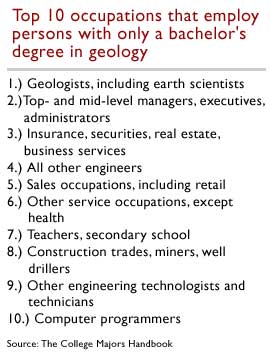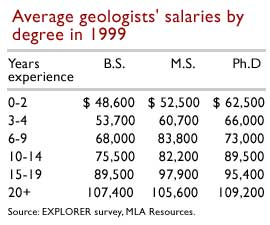NEW YORK (CNNfn) - There's a common thread that runs through Jason Hanson's tapestry of work experience. And according to the 23-year-old graduate from the University of Wisconsin, it is no accident.
"All of my summer jobs during school were outside, including the federal Forest Service, the U.S. Park Service, construction and landscaping," he said. "I knew I wanted to be outside instead of being stuck behind a desk all the time. That was important to me."
So important, in fact, that Hanson opted for a bachelor's degree in geology, knowing it was one of the few majors that afforded him the opportunity to get out into nature and escape from his seat often enough to break up his day.
Now a staff geologist with Pioneer Environmental in Chicago, Hanson estimates he spends roughly 50 percent of his workweek out in the field.
"I help our project managers with their field work and do environmental site assessments," he said. "I also write reports."
Hanson's other duties including taking soil tests, surveying monitoring wells and helping to install remediation systems, including overseeing the construction of ditches.
"I knew I wanted to do something environmental and outdoors because it seemed like it was up and coming," he said.
On the job
Geologists, like Hanson, study the composition, processes and history of the Earth, according to the Bureau of Labor Statistics. They use high-tech instruments and scientific theory to determine how rocks were formed and what has happened to them since formation. They also study the evolution of life by analyzing plant and animal fossils.
"Geologists are the type of scientists where they are part artist and part scientists," said Larry Nation, spokesman for the American Association of Petroleum Geologists in Tulsa, Okla. "We can see things on top of the earth and other scientists gather information but a geologist needs to know what's beneath the earth, and for that you have to imagine. You have to imagine dimensions, space and time. That's what makes them really interesting people."
The Bureau reports geologists, geophysicists and oceanographers held about 44,000 jobs in 1998, not including the large number who work in faculty positions in colleges and universities. 
Among salaried geologists and geophysicists, nearly one in three were employed in engineering and management services, and one in six worked for oil and gas extraction companies or metal-mining companies. About one geoscientist in eight was self-employed; most were consultants to industry or government.
Some become land surveyors and well drillers for construction firms and government agencies.
The federal government is one of the largest employers of geologists, the BLS notes, including the Department of the Interior's U.S. Geological Survey (USGS), the Departments of Defense, Agriculture, Commerce and Energy, and the Environmental Protection Agency (EPA).
Still, just one-third of geology majors with a bachelor's degree end up working in jobs that are closely related to their field of study, including earth scientists and geologists, according to The College Majors Handbook, published by JIST Works, Inc.
Many head into insurance, securities, real estate and business.
They defect partly in pursuit of better pay or opportunity and partly due to the limited opportunities within the field for undergraduate degree holders.
"A bachelor's degree in geology or geophysics is adequate for some entry-level jobs, but more job opportunities and better jobs with good advancement potential usually require at least a master's degree in geology or geophysics," the BLS states, noting that graduates with degrees in physics, chemistry, mathematics or computer science may also qualify for some geophysics or geology jobs.
As with most science-based professions, it notes, "a Ph.D is required for most research positions in colleges and universities, federal agencies, and state geological surveys."
Visit CNNfn's Career page every Friday to read "Working your Degree," a new column that highlights job opportunities for a different college major each week. Click here for previous profiles on professions including: philosophy, political science, engineering, economics, computer science, physical therapy, history and teaching professions.
Environmental pursuits
Peter Haff, a geology professor at Duke University's division of earth and ocean sciences, said one of the most common career paths taken these days by students in his department include the red-hot field of environmental consulting.
"Historically, most of our students were trained to go out and find a job that had something directly to do with geology, but we noticed there were a lot of students just interested in how the earth works, especially with the rising sea levels and global warming in the news," he said. "We started offering a Bachelor's of Arts (BA) degree for those students and they now make up a good fraction – maybe 40 percent – of our student base."
Nation agrees that environmental consulting is fast becoming the land of opportunity for geology majors as companies struggle to comply with a growing number of federal and state regulations.
Same goes, he said, for the field of hydrology – the study of water forces on the earth and the search for clean water beneath the earth's surface.
"In the future, that is going to be an extremely important thing," Nation insists. 
The BLS suggests all students pursuing a career in environmental consulting take courses in hydrology, hazardous waste management, environmental legislation, chemistry, fluid mechanics and geologic logging.
An understanding of environmental regulations and government permit issues, it adds, "is also valuable for those planning to work in mining and oil and gas extraction."
Lastly, the Bureau suggests students interested in becoming a geoscientist should arm themselves with computer skills in data analysis, computer modeling and digital mapping, for starters. Among other things, geoscientists study information collected by remote sensing instruments in satellites and construct field maps to search for oil and gas or predict seismic activity.
Be forewarned that anyone who sticks with geology as a profession should expect to travel often and to remote field sites by helicopter or four-wheel-drive vehicles, covering large land areas on foot. A growing number of exploration geologists and geophysicists work abroad, the BLS reports, "sometimes in remote areas and under difficult conditions."
The Bureau predicts employment of geologists, geoscientists and oceanographers will grow between 10 percent and 20 percent through 2008, about as fast as the average for all occupations.
Demand will be driven in part by the need to replace retiring Baby Boomers, but mostly by the need for organizations to comply with "an increasing number of environmental laws and regulations, particularly those regarding groundwater contamination and flood control."
Paycheck check-up
As for salaries, a career in geology can be rewarding.
The National Association of Colleges and Employers (NACE) reports starting salaries this fall for graduates with bachelor's degrees in geology and related sciences averaged $34,755. Grads with a master's degree usually earn about $10,000 more.
And the Handbook notes that geology grads who are employed full-time earn roughly $52,000 a year. That's nearly 8 percent higher than the national average for all full-time employed college graduates. Those who work in jobs that are closely related to their field of study earn about $54,000 a year, while those who are self-employed as consultants or business owners bring in $74,000.
The average annual salary of full-time employed geology majors who are employed in unrelated jobs is less, at $47,000.
Nonetheless, those in the field insist a career in geology offers many rewards and opportunities that have little to do with take-home pay.
In spite of all the technological advancements in seismic tools and predictors, Nation said it's still an imprecise science and "you never know until you put the drill bit into the earth."
"By definition, geologists love the earth and everything to do with the earth," said Nation, of the AAPG. "So imagine anything that has to do with the outdoors and the study of the outdoors. These people are prone to love that. From forest rangers to surveyors and civil engineers, geology is an extremely versatile science." 
|

